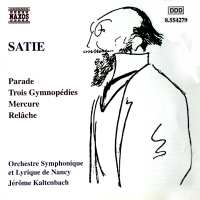|

Stringent economy

Satie's ballets discussed by WILFRID MELLERS
in the light of a new recording
 This new CD will make a splendid companion to Steven Moore Whiting's
recently published, richly rewarding big book on Satie
the Bohemian: from Cabaret to Concert Hall. The disc covers the three
ballets, Parade, Mercure, and Relâche which,
along with the drame symphonique, Socrate, count as his major mini-masterpieces,
here presented in idiomatic performances. All three ballets incorporate
elements from Low Life - circus, music hall, cabaret, café-concert,
and (incipiently) American jazz and ragtime. All touch upon the theme that
makes this apparently slight composer unexpectedly 'central' and even profound:
the relationship, in our rapidly industrialized technocracies, between men
and machines. This new CD will make a splendid companion to Steven Moore Whiting's
recently published, richly rewarding big book on Satie
the Bohemian: from Cabaret to Concert Hall. The disc covers the three
ballets, Parade, Mercure, and Relâche which,
along with the drame symphonique, Socrate, count as his major mini-masterpieces,
here presented in idiomatic performances. All three ballets incorporate
elements from Low Life - circus, music hall, cabaret, café-concert,
and (incipiently) American jazz and ragtime. All touch upon the theme that
makes this apparently slight composer unexpectedly 'central' and even profound:
the relationship, in our rapidly industrialized technocracies, between men
and machines.
Such was the explicit theme of Parade for which - during
the years of that First World War that threatened to (and perhaps did) destroy
'civilisation as we have known it' - Jean Cocteau devised the scenario,
Picasso the sets and costumes, and Satie the music, while Massine acted
as choreographer. Unsurprisingly, given that line-up, it was this 'ballet
cubiste' that transformed Satie from a Monmartre eccentric into a significantly
'modern' composer. The score pays homage to those instantaneous 'moments'
wherein we - like the young lovers, jugglers, and acrobats who, along with
the cubistically and mechanistically abstract 'Managers' who control them,
form the ballet's dancing personnel - precariously survive, teetering on
tightropes over tiny abysses. The precision of Satie's patterned figurations,
the meticulousness of his metrical structures, the simultaneous wit and
pathos of his fragmented tunes exactly catch modern man's vulnerability
and crazy courage: which must be why the score has worn so well. To achieve
the right balance between human frailty and mechanistic continuity is not
easy, though this performance passes the test in that the music sounds oddly
disturbing, even a shade minatory, and certainly not funny-ha-ha.
In a general sense the music of this avowedly eccentric and comical
character is seldom humorous, as were his intermittent verbal commentaries
on it. More commonly the music, though calm, is also grave, even dolorous,
in its lonesomeness. Parade was written in 1916 and produced the
following year around the Great War's desperate climax. Mercure was
composed in the war's aftermath, in 1920, and Cocteau was involved in it
vicariously, since he was an avowedly mercurial character given to japes,
jokes, and sleights-of-hand. Fortunately, however, Cocteau was not involved
in the production, on which the choreographer Massine worked amicably with
Picasso and Satie, free of the furies and fervours that the poet was apt
to generate. Satie claimed that his music was 'simplement des personnages
forains', and was therefore 'composée des rhythmes très particulières
aux trétaux'.
Though the ballet has little in the way of a story-line, it involves
mercurial transformation scenes, touching on the basic myth of Proserpine's
descent to the Underworld and being, in effect, a post-war rite of spring,
only a little later than Stravinsky's masterpiece. Satie makes no attempt
to illustrate events, yet manages to embrace, within his music-hall idiom,
the same precarious equilibrium between firmness and frailty that distinguishes
Parade, possibly with even more stringent economy, both in its slightly
surprising melodic definitions and in its sparely sonorous instrumentation.
The 'Nouvelle Danse', because rather than in spite of its tenuous simplicity,
is among Satie's most mysterious mini-creations; and the manner in which
it is fused with the perky Polka des lettres to indicate Chaos is
a mini-masterstroke.
Continue >>
Copyright © Wilfrid Mellers, October
9th 1999
 CD and purchase information
<< Music &
Vision homepage Aaron
Avshalomoff >>
CD and purchase information
<< Music &
Vision homepage Aaron
Avshalomoff >>
|